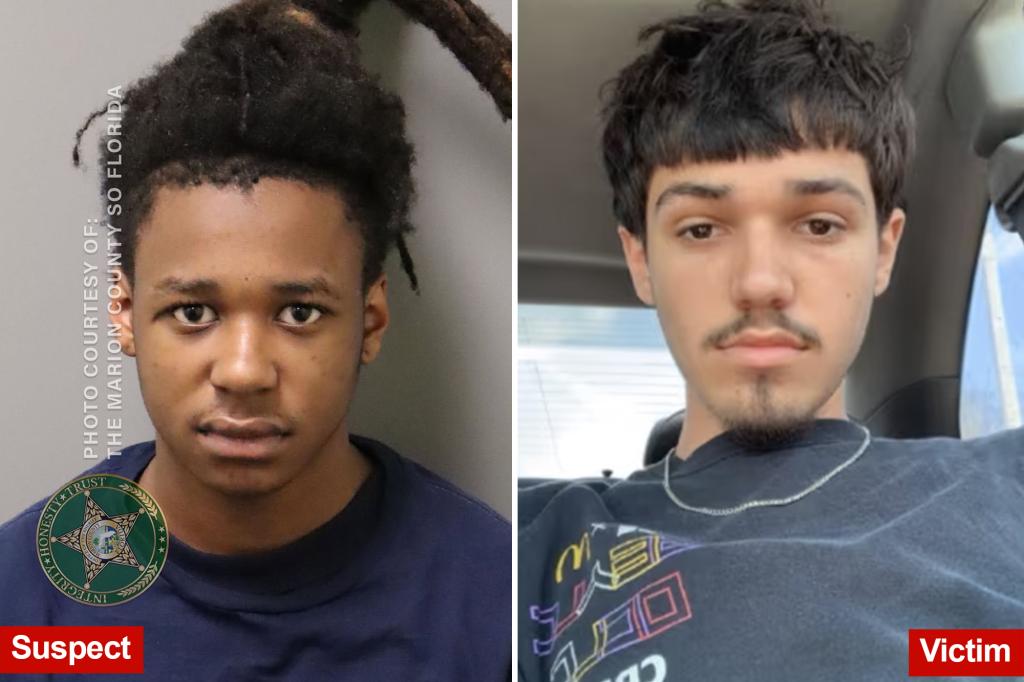In a tragic incident that unfolded in Florida, a teenage boy named Kydris Jackson, aged 14, has been charged with second-degree murder following the shooting death of 19-year-old Griffin Smith in what authorities described as a botched gun deal. The event took place on December 2, 2023, outside a Dollar General store, where Smith had met with Jackson to purchase a firearm that had been previously agreed upon for $350. Instead of a straightforward exchange, the deal escalated when Jackson allegedly attempted to extort additional money from Smith, leading to the violent confrontation. This marked a significant turn of events as the simple act of purchasing a firearm resulted in a deadly exchange that left one young man dead and another facing serious legal consequences.
According to the Marion County Sheriff’s Office, the situation spiraled out of control when Smith, attempting to leave the scene, was shot multiple times by Jackson. Eyewitness reports and forensic evidence corroborated the violent nature of the incident, with police later recovering 14 shell casings from the location, indicating the severity of the gunfire exchanged during the altercation. Responding to the scene shortly after 3:15 p.m., officers discovered Smith mortally wounded inside his Dodge Ram pickup truck, which was located off the road in a tree line. Tragically, he was transported to a local hospital but succumbed to his injuries shortly thereafter.
The firearm purchased from Jackson was recovered from Smith’s vehicle, providing critical evidence in the case. After the shooting, Jackson fled the scene, making a swift escape that complicated the ongoing investigation. He was, however, apprehended a few days later in Alachua County after law enforcement discovered him driving a stolen vehicle. A brief police pursuit ensued, resulting in his arrest and further investigation into his connection to the shooting. This turn of events highlighted the challenges faced by law enforcement in tracking down suspects involved in violent crimes, particularly those who are still minors.
The ensuing investigation lasted over a year and involved extensive efforts from law enforcement, including witness interviews, DNA analysis, and a thorough review of records to establish a link between Jackson and the fatal shooting. Such comprehensive investigative work underscores the complexities involved in prosecuting juvenile offenders in serious criminal cases. Throughout this lengthy process, authorities worked diligently to ensure that all factors were considered to build a strong case against Jackson. Eventually, he was linked to the crime through the collected evidence and the criminal details surrounding the case.
While Jackson was already in custody for an unrelated matter when he was charged with murder, the layers of his circumstances reveal a troubling narrative about youth involvement in violent crime and illegal firearms transactions. His case raises significant questions about the safety and supervision of minors, especially those entering into potentially dangerous arrangements, such as illicit gun sales. The community has reacted with shock and anger, grappling with the reality of youth violence and the implications it has for families and society as a whole.
Currently, Kydris Jackson remains held at the Marion County Regional Juvenile Detention Center, facing serious charges that could significantly impact his young life. The juxtaposition of his age with the gravity of his alleged actions presents a complex scenario for the judicial system, which must navigate the often murky waters of juvenile justice. As the legal proceedings move forward, the case serves as a poignant reminder of the tragic outcomes that can arise from reckless decisions and the dire need for preventive measures aimed at curbing youth violence in society.










